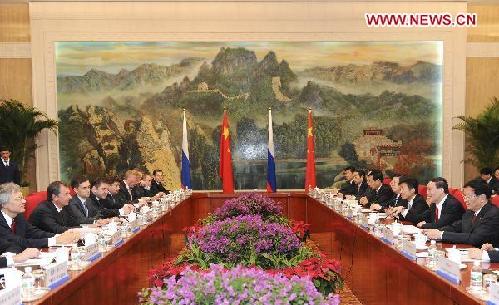|

Chinese Vice Premier Wang Qishan (2nd R) and Russian Deputy Prime Minister Igor Sechin (2nd L) co-host the sixth round of the Sino-Russian energy negotiators' meetings in Tianjin, east China, Sept. 21, 2010. (Xinhua/Xie Huanchi)
Sino-Russian ties were developing smoothly, as highlighted by increasing mutual political trust and closer practical cooperation, and faced important development opportunities, Wang said.
Sechin said Russia was willing to make efforts to ensure a long-term and stable supply of crude oil via the Russia-China pipelines, and promote bilateral cooperation in natural gas, coal, electricity trading, nuclear energy, energy efficiency and new energy.
Russia felt satisfied with the sound development momentum of bilateral energy cooperation, and the efforts exerted by the meeting mechanism, Sechin said.
The achievements made in energy cooperation reflected the high-level bilateral partnership of strategic coordination, he said.
After the meeting, the two sides signed three energy cooperation documents, which covered areas such as oil, coal and coal-to-liquids.
Wang and Sechin also attended a foundation-laying ceremony for the China-Russia Eastern Petrochemical (Tianjin) Oil Refinery Tuesday afternoon.
PetroChina Company Limited and Russia's Rosneft are building the 30 billion yuan (4.5 billion U.S. dollars) refinery. The Chinese company holds a 51 percent stake in the project while the Russian company has a 49 percent stake.
The joint venture will process crude oil from Russia to produce gasoline, diesel oil and other petrochemicals. The refinery will have an annual capacity of 13 million tonnes.
Addressing the ceremony, PetroChina General Manager Jiang Jiemin said the refinery will help optimize China's crude oil mix, enhance China-Russia energy relations, and boost economic development in the port city of Tianjin.
Sechin, the deputy Prime Minister of Russia, hailed the refinery as "a milestone in Russia-China relations" and an important step in energy cooperation between the two oil companies.
|

